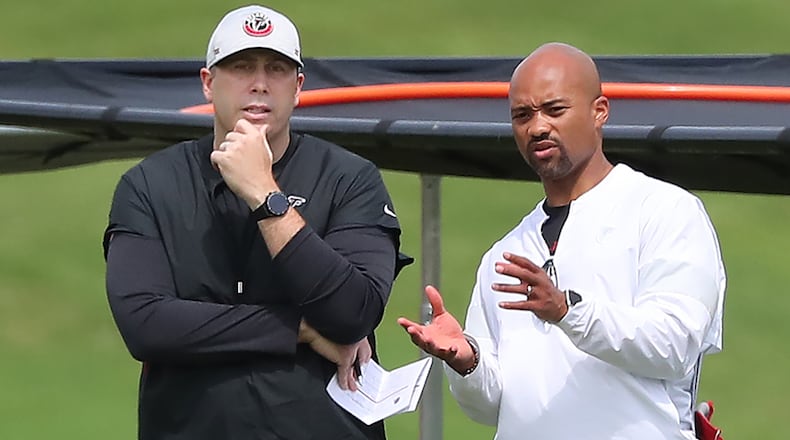“Culture” and “makeup” are Terry Fontenot’s watchwords for the 2023 offseason. The Falcons general manager mentioned them a total of 14 times in remarks to media following the season and seven times during his NFL scouting combine interview last month. Clearly, those principles will guide Fontenot when the NFL’s free-agency period begins unofficially Monday.
Fontenot doesn’t just want good players. He wants players who have the right character. The Falcons won’t sign a talented player if he doesn’t fit what Fontenot calls a “very strong culture” that stresses development, enthusiasm, positivity and competitiveness.
“How you do anything is how you do everything,” Fontenot said of the team’s approach.
It doesn’t have quite the same ring as Dan Quinn’s “Brotherhood,” but it’s a similar concept. Quinn’s best work as Falcons coach was developing a strong team spirit in the early years. There was a real sense that everyone in the building at Flowery Branch was pulling in the same direction.
It worked, until it didn’t.
Slogans quickly turn into punchlines when personnel mistakes mean there aren’t enough good players on the roster. A player who does things the right way every day is a liability if he can’t play. It’s harder for a coach to preach togetherness when a team loses because it’s overmatched by opponents.
I’m not discounting the notion that the Falcons have developed a strong culture under Fontenot and coach Arthur Smith. There were signs of that in Year 2. The Falcons didn’t give in so easily when things got tough in 2022. I understand why Fontenot is wary of bringing in players who could be volatile to the mysterious elements that make up team chemistry.
I also believe that an obsessive focus on “culture” and “makeup” can lead to a certain kind of arrogance among team decision-makers. It does the Falcons no good to turn away objectively good players just because they don’t fit Fontenot’s and Smith’s subjective ideas about what makes the players a good cultural fit, or vice versa. Fontenot and Smith need to be careful about not getting so caught up in the intangibles that they discount what they see on tape.
There’s such a thing as teams overvaluing their own players because they like them. That was a blind spot for former Falcons coach Mike Smith. The result was handing out bad contracts to players who were good fits in the locker room and marginal performers on the field. The current Falcons regime must avoid that trap when deciding which free agents to sign from other teams and whether to re-sign their own free agents.
Fontenot said his preference is to retain as many of the team’s free agents as financially possible because it’s riskier to bring in outside players who may not fit the team’s culture. That’s conventional wisdom in the NFL. Better to pay for the players you know than overpay for those you don’t.
But that view is not supported by the empirical evidence gathered by analyst Steven Ruiz. Writing for USA Today in 2019, Ruiz examined the contracts for players signed as free agents and who signed contract extensions and compared their production using Pro Football Focus grades.
Ruiz’s conclusion:
“On average, NFL teams are overpaying homegrown vets by $2.37 million. Free-agent acquisitions are being overpaid by $1.19 million. Second contracts, in general, return less value — the market is no longer capped. So both numbers are negative, but there’s a wide spread between the two that favors signing free agents above re-signing your own players.”
Ruiz found that those numbers aren’t skewed by teams paying a premium to sign quarterbacks to extensions. It also wasn’t the case that free agents who signed relatively expensive deals provided less value than players who signed big-money extensions. In both cases, free agents offered more bang for their buck than players who were signed to contract extensions to keep them off the market.
The reason second contracts return less value is because good players signed to their first contracts are such great bargains. The salary scale for drafted players is set well below what they would earn on the open market. That’s a big reason why building a team through the draft is the best way to do it in the long term.
But the reality is that teams make mistakes in the draft all the time. They also make miscalculations with contract extensions. Signing free agents from other teams is a good way to improve weak spots on the roster. Shying away from those players because of the unknown and sticking with the players you know isn’t a good way to do business in the NFL.
That doesn’t mean the Falcons should go wild giving out big contracts to free agents. There’s a negative correlation between spending in free agency and winning. The teams that spend the most win the least.
There’s a selection bias at play there, though. Bad teams spend more in free agency because they have more roster holes to fill. As Fontenot put it, the Falcons have a lot of cap space because they have a lot of work to do.
The Falcons have needs at pretty much every position on the field. Some of them will be filled in the draft in April. But rookies are a crapshoot even if they are relatively cheaper to employ. Veterans come with risks, too, but they can be evaluated as NFL players by what they’ve done in NFL games.
Admittedly, I have a hard time getting my head around concepts like “culture” and “makeup” because they can’t be measured. I know from experience that they do matter. I also know that talent matters more. Fontenot shouldn’t go overboard with those buzzwords when deciding which veteran players to sign.
Give me a roster filled with players who can block, tackle, pass, catch and run alongside a few misfits. You take the team with lots of solid guys but less talent. I’ll spot you points.
About the Author


